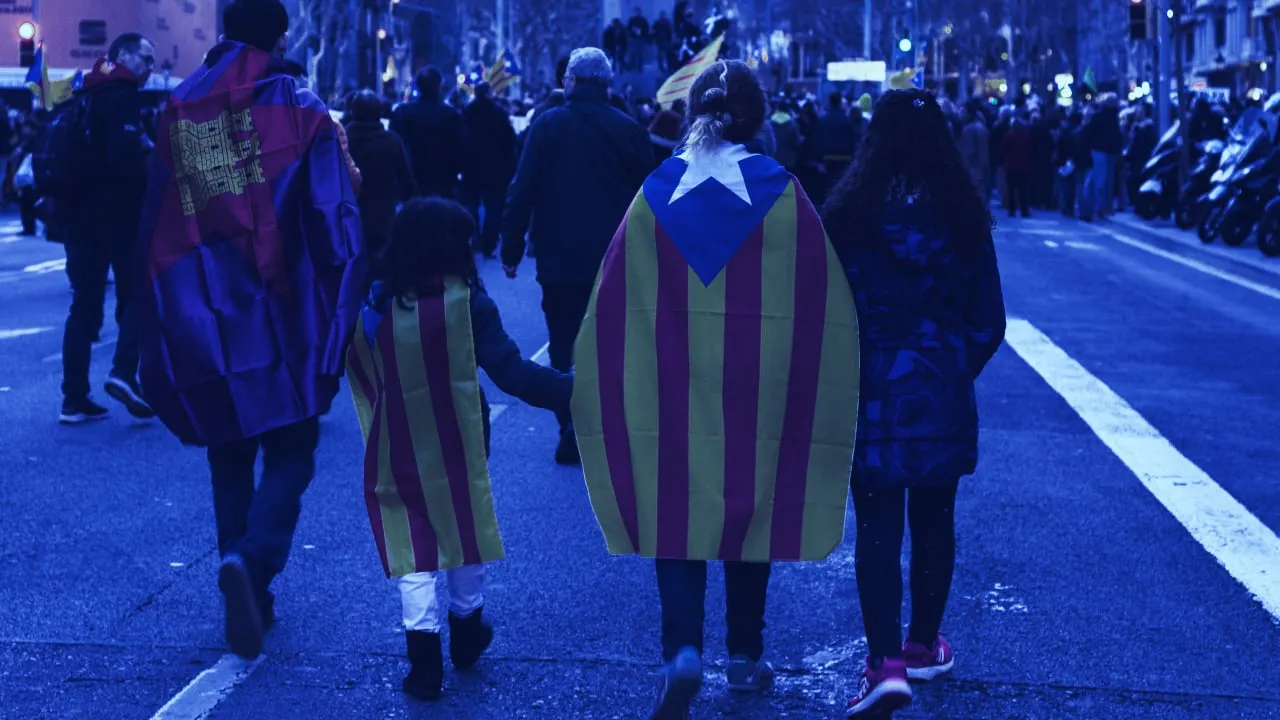Catalonia, an embattled, semi-autonomous province in the northeast region of Spain, revealed plans earlier this week for a blockchain-based, “self-sovereign” identity system, called IdentiCAT.
It rightly caught the attention of the cryptosphere as a technology that aims to independently validate Catalan citizens’ identification data—using a decentralized ledger, instead of the traditional methods used by the Spanish government.
But IdentiCAT isn’t really about blockchain.
The self-sovereign goals of Catalonia’s separatist government, in fact, have much more to do with politics—and the province’s ongoing campaign for independence—than with technology. And the timing of Catalonia’s announcement is no coincidence either.
“I believe that IdentiCAT is a good idea, carried out at the worst possible time," Jose Antonio Bravo, a blockchain technology and accounting consultant based in Spain, told Decrypt. "The existing political conflict in Catalonia does not allow the peaceful management of a decentralized digital identity project.”
Just days ago, hundreds of thousands gathered in Barcelona to demonstrate their support for Catalonia’s secession, according to the Associated Press. It’s all part of a struggle for Catalan independence that goes back centuries.
Indeed, some in the region say that Catalonia’s call for a decentralized identity system should be viewed as nothing less than a political provocation—a message to the Spanish government that the province is furthering its plans to end its dependence on Spain. It’s an issue so sensitive that many of the regional experts we spoke to on the matter refused to comment publicly for fear of being seen as taking a side.
Identity in search of a country
Early signs of Catalonia’s plans for a decentralized identity system—and, in a sense, weaponize blockchain tech politically—arose in late August, when the Catalan government approved a budget of €4 million to build a new “blockchain department” that would develop a number of public services.
IdentiCAT, which the Catalan government made clear would only be available to citizens of Catalonia (and not by accident), is one of those services. “This government aims to put people at the center of their policies, including digital ones," said Quim Torra, President of Catalonia, at the time of the project’s announcement. Torra said that the data individual citizens choose to share through IdentiCAT would be completely voluntary.
It’s a system designed to “empower citizenship,” he said, knowing the full weight of those words and how they would be perceived by Spain.
"Some will want to question the project, because they may be scared to empower people,” Catalan Minister of Digital Policies and Administration Jordi Puigneró said in a statement. “Let's be a country moving forward."
Note that Puigneró’s reference to “country” here means Catalonia, not Spain, and the notion of “moving forward” will have different meanings depending on your political allegiance, which is key to understanding the controversy surrounding IdentiCAT.
Meet the new boss, same as the old boss
From Spain’s perspective, there’s nothing to cheer about with regard to Catalonia’s plans to “move forward” through a self-sovereign identity platform, which is why actually implementing it won’t be as easy as it might initially sound, according to Bravo.
And although the Catalan government is emphasizing its intention to “empower” its citizens, the project itself from a tech perspective lacks the revolutionary vision of its politics.
"Both Catalan and Spanish initiatives have centralized visions to build their model of a nation-state,” Alex Preukschat, an author and coordinator of Blockchain Spain, told Decrypt. On the other hand, decentralization through blockchain, he explained, “is focused on creating a total autonomy of the individual to manage their identity."
"These efforts are a little more aligned with the centralized ideas of a classic nation-state,” Preukschat explained. He believes, however, that society as a whole is “evolving towards the creation of decentralized or even autonomous organizations.”
Nevertheless, there are plenty of obstacles in the way of Catalonia’s implementation of its self-sovereign identity solution, IdentiCAT. And if it’s other struggles with Spain are any indication, this could be a very long road ahead indeed.





